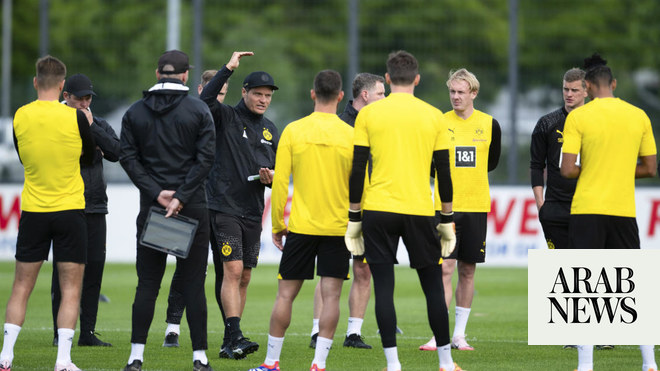
When Paris stepped in to host the Champions League final, the biggest match in international football after the World Cup final, the French authorities saw a chance to show that the nation was the ideal place to hold global sporting events.
This weekend, those hopes appear to be dashed as French opinion polls show widespread disapproval of the chaos that ensued, amid growing criticism of politicians and the police.
Unlike the UK, which witnessed fan violence at last year’s delayed Euro 2020, or autocratic states such as Russia and China, which respectively hosted the most recent World Cup and Winter Olympics, France had been confident it would put on a proper – safe – show.
With the Rugby World Cup in France next year and the Olympic Games in Paris in 2024, the Champions League final – which Paris offered to host after Uefa realised the Gazprom Arena in St Petersburg was no longer a suitable venue – would be the perfect kick-off to two years of French organisational excellence.
What they did not expect was a week of headlines about French police teargassing and pepper-spraying children.
Seven days on, the French authorities are under increasing pressure to fully investigate what the nation’s press has described as “a fiasco”.
French interior minister Gérald Darmanin has doubled down on his insistence that Liverpool supporters brandishing up to 40,000 fake tickets were to blame, sparking criticism at home and abroad.
Initial inquiries suggest the number of counterfeit tickets scanned at the turnstiles was less than 3,000, while fans have pointed out that even that may be an exaggeration after many with valid tickets found the scanners did not accept them.
With the first round of legislative elections just a week away, the Élysée was hoping the row would have blown over by now. But an opinion poll by Odoxa-Backbone Consulting found that 76% of French people do not believe Darmanin’s version of events at the Stade de France last weekend. Only 33% of those asked believed Liverpool fans were to blame for the chaos and 53% said they were concerned about the staging of the Rugby World Cup and the Olympics.
If the French government had hoped the accusations of police violence could be denied then quashed, it appears to have been caught on the back foot by the anger from abroad and at home.
Faced with video footage and statements from dozens of football fans present, Darmanin, 39, who is on the right of Emmanuel Macron’s centrist governing party, was forced to row back on his stance. Quizzed by the Sénat, the upper parliamentary house, he admitted that “things could have been better organised … it’s clear that this great sporting event was spoiled”.
With reports that Macron was furious over what happened, Darmanin also apologised “very sincerely” for what he called the “disproportionate use” of teargas, which he said had caused “serious problems, notably for the children”.
Fabrice Arfi of the investigations website Mediapart said it was astonishing that it took pressure from Liverpool fans and the British media to make the minister apologise.
“Darmanin has been unable to recognise any police violence in the past. So we have got used to this in France. The French have never had any apologies from him,” said Arfi.
“Everyone outside of France is shocked to see how the French police behaved, but it’s nothing new for us.” However, last week Darmanin was still insisting that up to 40,000 English football fans turned up for the match either without a ticket or with a false ticket, which he described as “massive, industrial and organised fraud”.
Le Monde described Darmanin’s mea culpa as “timid”, saying: “There was no change deep down”.
Libération published a picture of Darmanin with a Pinocchio-like nose. In an editorial, the paper said the interior minister was sticking to a “fairytale that clears the police” and said his excuses were feeble and “bordering on arrogance”.
“France missed an opportunity to prove it still knows how to organise a world event without problems: it now needs to prove it knows how to learn the lessons of its failures.”
The chaos was heightened by attacks on fans by local thugs who assaulted Liverpool and Real Madrid supporters while the police appeared incapable of stopping them.
Sebastian Roché, an expert on French policing from Sciences Po in Grenoble, suggested that, unlike British police, the French force does not operate by public consent.
“French police are not expected to talk to the public. They are not trained to send information up the line to their superiors to change plans according to developments on the ground. They are poor at explaining to the public what they are doing and why,” said Roché in Le Monde.
Events at the Stade de France have thrown an international spotlight into a dark corner of French policing: while outsiders are shocked, the French have become used to police using teargas, pepper spray, water cannon and even “flash-ball” rubber pellets to control crowds.
During the gilets jaunes (yellow vests) protests, several people suffered catastrophic injuries including the loss of eyes and hands. Even non-protesting bystanders have been victims: Zineb Redouane, 80, was closing her shutters at her flat in Marseille during a protest when she was hit by a teargas grenade travelling at an estimated 60mph in December 2020. A subsequent report cleared the police of wrongdoing.
In 2018, at the height of the gilets jaunes demonstrations, Reporters Without Borders and the National Union of Journalists complained of police targeting journalists at protests despite them being easily identified as members of the press.
Afterwards, Jacques de Maillard, a researcher specialising in police issues and the director of the Centre for Sociological Research on Law and Penal Institutions, told France 24, there were “structural problems in terms of recruitment, training, philosophy and management” of the police force.
Arfi said that French politicians had a problem facing up to police violence. “Maintaining order in France is very political. The instinctive reaction of politicians in France is not to respond but to deny and that denial creates a sentiment of impunity,” he said.
“Darmanin and Macron are simply unable to recognise or accept there is such a thing as police violence. What will come of this now people outside of France have seen it, who knows.”












